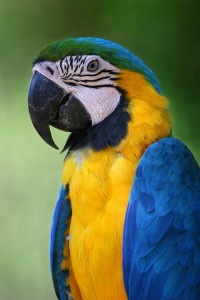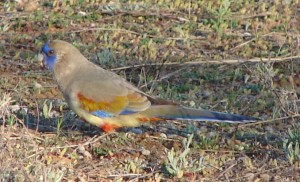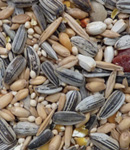Blue and Gold Macaw Care Guide
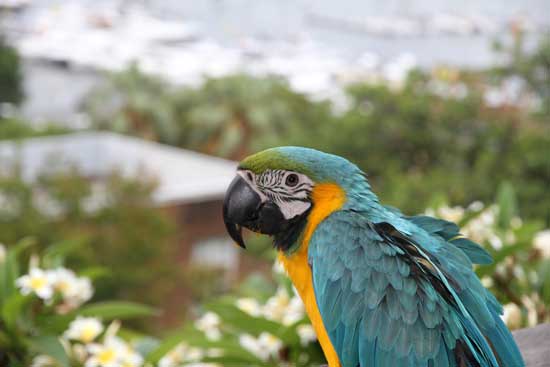
The Blue and Gold Macaws’ sociability and even temperaments make them great pets. They are playful, comical, mischievous, extremely intelligent, and often very warm and loving. They high intelligence given them a willingness to learn and develop a great talking ability. Like most parrots, the Blue and Gold Macaw loves attention from their owners and will form a strong bond with its family.
As they are large birds, and as such are capable of extremely loud vocalizations, because of this, they may not be the best choice for those who live in apartments and condominiums, or that have young children.
Distribution and Habitat of Blue and Gold Macaws
The Blue and Gold Macaw originated from South America, almost the entire northern half of the continent. They are usually seen in pairs or flocks of not more than 20 birds in areas such as open marshlands and woodlands, rainforest, and other areas with large trees.

The Blue and Gold Macaws is a large parrot with a green forehead, fading into blue.
which covers the nape, back, tail, and wings. The chest and underside of the wings and belly are a bright golden yellow. They have large black beaks, and white patches of skin around their eyes and face. These patches are adorned with rings of tiny black feathers. They are approximately 85 to 90cm in height and have a wingspan of 102 to 112.5cm wide.
The Blue and Gold Macaw has a life span of 60 + years.
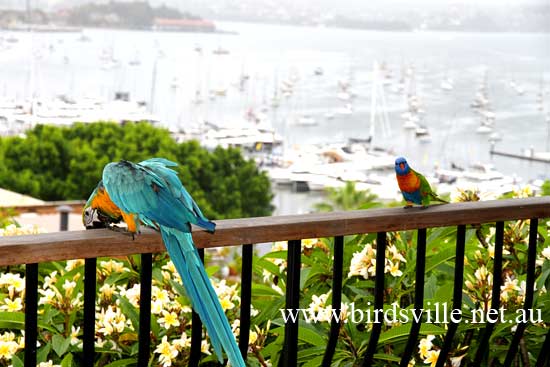
Cages for macaws
Blue and Gold Macaws are a very large birds and require a large cage for many toys, perches, food/water dishes, as well as sufficient space for them to move around and spread they wings. This eliminates boredom while caged.
Toys are very important for entertainment; choose thing that will make them think, things they can chew and destroy and some strong durable toys for longevity.
Macaws need to have plenty of time daily outside their cage as well. It would be a good idea to look into a specially designated play area that provides them a change of
scenery from their cage or a stand that can be moved around the house as the family moves. Any play area must be baby proofed. They will go after your power cords; they will chew your wooden furniture and anything that is within their grasp.
Cages, toys, stands and everything you need for you macaws are available at Birdsville.

Diet For Blue and Gold Macaws
Pellets, such as Vetafarm Nutriblend Pellets Large/Medium, Murphy’s Pellets, Peckish pellets, Pretty bird Pellets and Vetafarm Macaw Nuts.
Seed– Parrot mix for young birds, Small Parrot mix for matured birds Be sure to use a good quality fresh seed mix so be wary of many supermarket seed mixes as they may have been stored for long periods of time bird specialists and produce stores stock avigrain. As a treat it is also recommended Passwell fruit and nut mix or Avigrain fruit and nut mix. Do not over feed mature birds too much oily food such as sunflower seeds and nuts as it can cause fatty liver disease obesity and feather loss due to the excess of oils. A blend of seed in one dish and pellets in another dish is perfect.
Fruit and veggies- such as broccoli, carrots, green beans, squash, zucchini, cucumbers, tomatoes, oranges, apples, strawberries, bananas, grapes, melons, kiwi, mango, papaya, rock melon, sweet potatoes and pears.
Fresh water should be provided throughout the day.

Hygiene
Your Macaws’ cage should be cleaned on a regular basis, the old food shouldn’t ‘be allowed to accumulate in the cage, on perches or in feeders. Water should be changed on a daily basis. Never allow fruit and veg to go old and moldy.

Worming is important for your Macaw. You will need to wait few weeks to two months after being taken home (check with the staff from Birdsville, when purchasing). Worming will need to be done every 6 months; this will help keep your bird healthy. The two most common parasites of cage birds and their environment are lice and mite. If your Macaw is unusually itchy and scratching a lot, then it could most probably have one of these, but it can be easily controlled with a Mite and Lice spray, available at Birdsville.
Toys and Stimulation for Macawes
Toys are used as a form of environmental enrichment, but enrichment shouldn’t stop there. As an ex-zookeeper it was a major concern that all animals must have a variety environmental enrichment to keep the critters entertained. This is the same for anyone who has a tame parrot at home. Enrichment is important because parrots simply cannot thrive with only perches, food and water. The fact is birds provided with enrichment are unlikely to developed psychological problems such as self-mutilation, feather plucking and excessive squawking.
Enrichment will in fact effect your bird in a positive way with its mental and physical development when training your bird, you will actually end up with a better, less fearful, friendlier and relaxed bird which will be more easily trained. Enrichment can be chewing toys, play toys, leather toys, acrylic plastic toys, wooden toys, shredding toys, ropes, swings, ladders, bells, balls, birdie balls, plain cardboard, small boxes, wicker baskets, tray of wheat grass, plants, bird baths, different foods, food kabobs and nuts, just to name a few (all available at birdsville). You may also find in your local area pinecones, hide food inside pinecones, twigs, bendy branches, flowers and branches- safe flowers are bottle brush, grevilia, eucalypt melaleuca flowers, hibiscus, marigolds, dandy lions leaves and all, roses, violets to name a few.
Note anything found outside should be disinfected and nonpoisonous and toys must be nontoxic.
Enrichment tip – the trick to keeping them entertained is regularly rotating toys as they will become bored with the same toy in their cage day after day. Changing them regularly will create interest for your bird as if they are receiving a whole new toy to play with.
Training Macaws
This is an important factor of having a well-behaved hand raised Blue and Gold Macaw. Your bird needs to be handled in a quiet, relaxed situation, but don’t over stress your bird in the first few weeks of taking it home. The more time you spend with your bird, the better your bird will become.
Get your bird used to being touched all over from an early age; many macaws like to be stroked behind the head and under the wings.
http://www.youtube.com/watch?v=kHJkM4BZtWM&feature=youtube_gdata_player
Be careful what you say around your bird!
